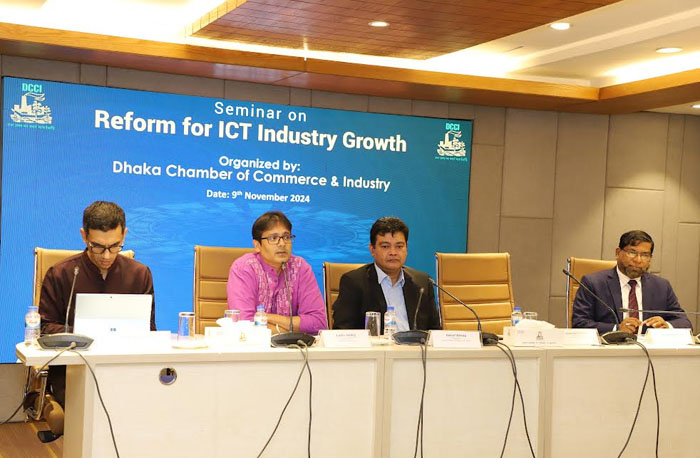
DHAKA, Nov 9, 2024 (BSS) - Speakers at a seminar today said that integrated
planning and effective implementation are essential for ICT development in
the country.
They also identified that insufficient infrastructure, lack of necessary
policy support, complex credit support, lack of access to finance, shortage
of skilled manpower and absence of supportive duty and tax structure are some
of the issues for which desired development in the information technology
sector is not being tapped fully in the country.
They said this while addressing a seminar on "Reform for ICT Industry Growth"
organized by the Dhaka Chamber of Commerce and Industry (DCCI) held at its
office today.
Lutfey Siddiqi, Special Envoy on International Affairs to the Chief Adviser,
spoke at the seminar as the chief guest while Chowdhury Ashik Mahmud Bin
Harun, Executive Chairman, Bangladesh Investment Development Authority
(BIDA), spoke as special guest.
Lutfey said the present government has been working in a changed environment,
which needs to be considered by all.
"If the existing policies are properly implemented, it will be easier to do
business activities along with rendering citizen services and the current
government is giving more priority to these issues," he added.
The Special Envoy said there were a lot of inconsistencies in the central
bank's reserve, export statistics and other data, which the current
government has taken several initiatives to address. "It's never possible to
formulate a proper plan without proper statistics,"
He said the present government has already formed a number of reform
commissions, whose activities are continuing, where citizens from all walks
of life, as well as representatives from the private sector in particular,
can present their proposals.
Executive Chairman, BIDA, Chowdhury Ashik Mahmud Bin Harun said, after the
ready-made garment industry, the IT sector has such potential to be the next
RMG of Bangladesh.
"It's possible to expand domestic and foreign investment in addition to
employment generation, especially for the young population through this
sector," he added.
Harun said activities are going on behalf of the BIDA to simplify the
permitting process for foreign nationals who are working in the country.
He also informed that a relationship officer would be engaged in the front
office of BIDA and his job would be to facilitate all related services to the
investors from a single desk.
DCCI President Ashraf Ahmed said policy reform, easy access to finance and
up-skilling are key to its global market growth for information technology
which includes IT services, software and devices worth nearly $3 trillion
dollars.
"Our IT industry with nearly $2.5 billion of revenue is present in a small
segment only despite having one of the largest pools of IT related workers in
the world," he added.
He said the government needs to up-skill the workforce, focus on delivering
higher value added services and expand manufacturing capacity across the
semiconductor value chain.
"We need to intervene on building expertise in design, assembly packaging and
testing (APT) sub segments, and pursue opportunities in integrated device
manufacturing (IDM) for the emerging IOT markets," he added.
Ashraf said in order to exploit its potential, it is essential to formulate
short-term, mid-term and long-term strategies, proper implementation,
investment, coordination between all the stakeholders, and including the
public and private sectors.
The software and services export sector has seen an exponential growth,
reaching export revenue of around $1 billion in FY 2024, he added.
Mir Shahrukh Islam, Managing Director of Bondtein Technologies Ltd. in his
keynote paper highlighted that more 2600 IT companies are in operation in
Bangladesh employing more than 3,50,000 workers while the market size is more
than $2.34 billion.
With a limited scope of software services, Bangladesh does not have any
device production capacity, he said. The largest export destination of IT
products from Bangladesh is USA worth of $226.8 million.
Bangladesh Bank Executive Director (ICT) Muhammad Zakir Hasan said there is
no alternative to integrated planning for the development of the country's IT
sector.
He said the infrastructure development here is still not up to the mark,
where there is a lot of scope for private sector investment to come forward.
He also proposed to form a steering committee with the participation of
stakeholders for the overall development of the sector.
Syed Almas Kabir, former president of BASIS, said tax incentives can be given
to encourage the ICT entrepreneurs. He emphasized on increasing the use of
sustainable and green information technology.
He opined that the government could introduce Sovereign Credit Guarantee
Scheme to provide loans to the IT entrepreneurs on easy terms.
Kabir underscored the importance of a Data Privacy Act saying that R&D in
this sector should be incentivized.
Taimur Rahman, chief corporate affairs officer of Banglalink Digital
Communications Limited, Md Liakot Ali, Additional Managing Director of Walton
Digi Tech Industries Limited also spoke.
Senior Vice President Malik Talha Ismail Bari moderated the open discussion
session.
DCCI Vice President Md Junaed Ibna Ali, Former Senior Vice President, DCCI MS
Shekil Chowdhury, Convenor of ICT Committee of DCCI Rashad Kabir and members
of the board of directors were also present at the seminar.